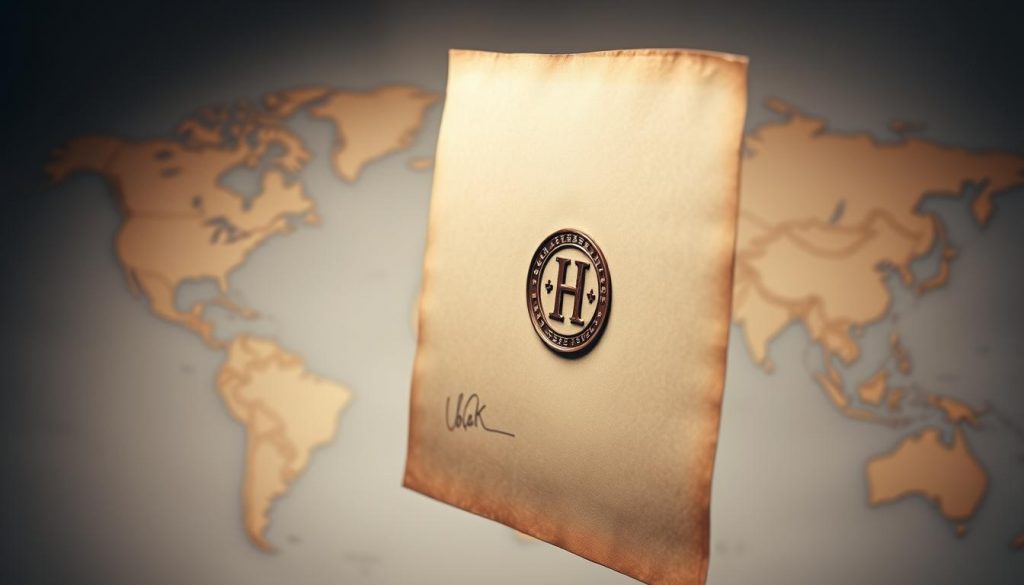Moving abroad doesn’t necessarily mean you no longer need a valid UK Will. Whether you’re a British expat with property or investments in the UK or a foreign national with business interests here, UK succession law can still apply to part of your estate.
Your UK Will governs what happens to your UK assets, such as property, bank accounts, investments, and personal belongings. Without one, these assets fall under UK intestacy law, which may not reflect your wishes.
We will guide you through the process of making your UK Will valid abroad, ensuring that your assets are protected and distributed according to your intentions.
Key Takeaways
- Having a valid UK Will is crucial even if you’ve moved abroad.
- UK succession law can still apply to your UK assets.
- A UK Will governs the distribution of your UK assets.
- Without a UK Will, UK intestacy law applies.
- We can guide you through making your UK Will valid abroad.
Understanding International Wills
International wills are designed for individuals with assets in multiple countries, ensuring their wishes are respected globally. As we navigate the complexities of global estate planning, understanding the nuances of international wills becomes essential.
Definition and Importance
An international will is a legal document that outlines how you want your global assets to be distributed after your passing. It’s crucial for individuals with assets abroad, as it ensures that your estate is managed effectively across borders. We recognize the importance of having a clear and valid will that covers all your assets, regardless of their location.
Making wills overseas involves understanding the legal requirements of the countries where your assets are held. This can be complex, but with the right guidance, you can ensure that your international will is valid and executed according to your wishes.
Key Differences from Standard Wills
International wills differ from standard wills in several key ways. Firstly, they must comply with the laws of multiple jurisdictions, which can be challenging due to differing legal requirements and tax implications. We help you navigate these complexities to ensure your international will is valid and effective.
- Compliance with multiple legal systems
- Tax implications across different jurisdictions
- Specific requirements for witnessing and notarizing the will
Understanding these differences is vital when making wills overseas, as it ensures that your will is executed as intended.
When to Consider an International Will
You should consider creating an international will if you have significant assets abroad, such as property, investments, or bank accounts in foreign countries. We advise individuals with complex international assets to seek professional guidance to ensure their estate is managed effectively.
An international will provides peace of mind, knowing that your global assets will be distributed according to your wishes. It’s a crucial step in global estate planning, ensuring that your loved ones are protected and your legacy is preserved.
Legal Framework for International Wills
Navigating the legal landscape of international wills requires a comprehensive understanding of the applicable laws and conventions. As we explore the complexities of creating a will that is valid across different countries, it’s essential to grasp the legal framework that governs these documents.
The Hague Convention and Its Impact
The Hague Convention on the Conflicts of Laws Relating to the Form of Testamentary Dispositions plays a significant role in facilitating the recognition of wills across borders. This convention allows a will written in one participating country to be recognized in another, provided it adheres to the form prescribed by the convention. Currently, over 40 countries are party to this convention, making it easier for individuals to ensure their will is valid internationally.
The impact of the Hague Convention cannot be overstated. It simplifies the process of creating an international will by providing a framework that is widely recognised. For instance, if you have assets in multiple countries, a will that complies with the Hague Convention can be recognised in all participating jurisdictions, reducing the risk of disputes or challenges to the will’s validity.

Recognised Jurisdictions
Understanding which jurisdictions are signatories to the Hague Convention is crucial for ensuring the validity of your international will. The following table lists some of the key countries that are party to the convention:
| Country | Status |
|---|---|
| United Kingdom | Signatory |
| Australia | Signatory |
| Canada | Signatory (with some reservations) |
| France | Signatory |
| United States | Signatory (with some reservations) |
Legal Considerations in Different Countries
While the Hague Convention provides a level of standardisation, it’s essential to consider the specific legal requirements of each country where you hold assets. For example, some countries have forced heirship rules that may override the terms of your will. Understanding these nuances is critical to ensuring that your wishes are respected.
When planning your international will, consider the following:
- The laws of the countries where you hold assets
- Any tax implications for your estate
- The potential for disputes or challenges to your will
By taking these factors into account and working with experienced legal professionals, you can create an international will that effectively manages your global assets and ensures your wishes are carried out.
Making Your UK Will Valid Overseas
To safeguard your global assets, understanding how to make your UK Will valid overseas is vital. Ensuring that your Will is recognised in foreign jurisdictions can be complex, but with the right guidance, you can protect your estate and provide peace of mind for your loved ones.
Essential Requirements
When making your UK Will valid overseas, there are several essential requirements to consider. These include ensuring that your Will is properly signed and witnessed, complying with the legal formalities of the countries where your assets are located.
The process involves understanding the specific laws and regulations of the jurisdictions involved. For instance, some countries have strict rules about the witnessing of Wills, while others may require additional documentation or notarisation.
Understanding Foreign Laws
Understanding the laws of the countries where your assets are located is crucial. Different jurisdictions have varying rules regarding inheritance, taxes, and the administration of estates. For example, some countries impose forced heirship rules, which can affect how your assets are distributed.
Translation and Language Issues
Translation and language barriers can pose significant challenges. It’s essential to ensure that your Will is translated accurately and that the translation is recognised by the relevant authorities. In some cases, an official translation may be required.

| Country/Law Aspect | UK Law | Foreign Law Considerations |
|---|---|---|
| Witness Requirements | 2 witnesses required | Varies; some countries require more or have different witnessing rules |
| Signature Requirements | Must be signed by the testator | Some jurisdictions have specific signature requirements |
| Language | English | Translations may be required; some countries require an official translation |
| Asset Types | Covers UK assets | May need separate Wills for foreign assets or specific clauses for foreign law compliance |
Foreign Assets and Will Validity
As you consider making a will that covers your international assets, it’s essential to grasp the complexities involved. Foreign assets can include property, bank accounts, investments, and personal belongings, all of which can impact the validity and execution of your will.

Types of Foreign Assets
Foreign assets can vary widely, from real estate properties in Spain to bank accounts in the United States. Understanding the types of assets you hold abroad is the first step in ensuring that your will is valid and executed according to your intentions.
- Real estate properties
- Bank accounts
- Investments
- Personal belongings
Estate Taxes and Liabilities
Estate taxes and liabilities associated with foreign assets can be complex. Different countries have different tax laws, and understanding these is crucial for effective estate planning. For instance, some countries may impose inheritance tax on assets located within their borders, regardless of the testator’s residence.
Key considerations include:
- Understanding tax treaties between countries
- Determining the tax residency of the testator
- Calculating taxes on foreign assets
Implications of Multiple Jurisdictions
When your estate involves assets in multiple jurisdictions, the complexity of managing your will increases. Different legal systems may apply, potentially leading to conflicts or inconsistencies in the execution of your will.
To mitigate these risks, it’s advisable to:
- Seek legal advice from experts in international estate planning
- Consider creating separate wills for different jurisdictions
- Ensure that your executors are aware of the assets and laws in each jurisdiction
By understanding the implications of foreign assets on your will’s validity, you can take steps to ensure that your estate is managed according to your wishes, regardless of where your assets are located.
Creating Separate Wills for Different Countries
Separate wills for different countries can offer a tailored approach to estate planning, addressing local laws and regulations. This strategy allows individuals to manage their international assets more effectively.
Advantages of Separate Wills
Creating separate wills for different countries has several benefits. It enables you to comply with local laws and regulations, reducing the risk of disputes or challenges to your will. Additionally, separate wills can simplify the administration process for your executors.
- Local Law Compliance: Ensures that your will is valid in the jurisdiction where your assets are located.
- Simplified Administration: Makes it easier for your executors to manage your estate according to local laws.
- Reduced Conflict: Minimizes the potential for conflicts between different legal systems.

Disadvantages to Consider
While having separate wills can be beneficial, there are also potential drawbacks to consider. Maintaining multiple wills can be more complex and costly than having a single will.
- Increased Complexity: Managing multiple wills requires careful coordination to ensure consistency.
- Higher Costs: Drafting and maintaining separate wills can be more expensive.
- Potential for Confusion: There’s a risk of confusion or inconsistency between the different wills.
How to Draft a Separate Will
Drafting a separate will for another country requires careful consideration of local laws and regulations. It’s essential to work with legal professionals who are familiar with the laws of the relevant jurisdiction.
| Step | Description |
|---|---|
| 1 | Consult with local legal experts to understand the specific requirements for wills in the relevant country. |
| 2 | Ensure that your will complies with local laws, including any specific formalities or requirements. |
| 3 | Clearly identify the assets covered by the will and ensure they are properly distributed. |
By taking a thoughtful and informed approach to creating separate wills for different countries, you can ensure that your international estate is managed according to your wishes and in compliance with local laws.
Revocation of Existing Wills
When considering the revocation of a UK will, it’s crucial to understand the potential impact on your foreign assets and overall estate planning. Revoking an existing will can have significant implications for your estate, particularly if you have assets in multiple countries.

Process of Revoking a UK Will
Revoking a UK will involves a formal process that must be executed correctly to ensure its validity. It’s essential to create a new will that explicitly revokes the previous one, or alternatively, a written declaration stating the intention to revoke the will, signed and witnessed appropriately.
To revoke a UK will effectively:
- Ensure the new will or revocation document is signed in the presence of two independent witnesses.
- Clearly state the intention to revoke the previous will within the new document.
- Notify the executors and beneficiaries of the previous will about the revocation.
Impact on Existing Foreign Assets
The revocation of a UK will can have varying implications for your foreign assets, depending on the laws of the countries where these assets are located. It’s crucial to understand how the revocation affects the distribution and management of these assets.
Consider the following:
| Country | Law Impact | Action Required |
|---|---|---|
| France | Revocation may affect inheritance tax | Review French inheritance laws |
| Spain | Could impact the distribution of assets | Consult with a Spanish legal expert |
Legal Advice for Avoiding Conflicts
To avoid potential conflicts when revoking a will, especially with international assets involved, seeking professional legal advice is paramount. Legal experts can guide you through the complexities of different jurisdictions and help ensure that your wishes are respected across borders.
Key considerations include:
- Understanding the legal requirements for revoking a will in different countries.
- Ensuring that the revocation does not inadvertently create conflicts or ambiguities in the distribution of your estate.
- Reviewing and updating your estate plan to reflect any changes in your assets or personal circumstances.
The Role of Executors in International Wills
Executors play a pivotal role in ensuring your international will is executed according to your wishes. Their responsibilities are multifaceted, particularly when dealing with assets across different jurisdictions.
Duties of Executors Across Borders
Executors are tasked with managing your estate, which includes gathering assets, paying debts, and distributing inheritances. In the context of international wills, this involves navigating different legal systems and tax regimes.
- Identifying and valuing assets in various countries
- Complying with local laws and regulations regarding estate administration
- Managing tax obligations, including estate taxes and income taxes
For instance, if you have assets in both the UK and France, your executor must be familiar with the legal requirements in both countries. This might involve understanding the implications of the Hague Convention on international wills.
Selecting Suitable Executors
Choosing the right executor is crucial, especially for international wills. They must be capable of handling complex legal and financial matters across different jurisdictions.
When selecting an executor, consider their:
- Experience in handling international assets
- Understanding of the legal systems involved
- Ability to communicate effectively across different languages and cultures
Managing Assets in Different Jurisdictions
Managing assets across borders can be challenging due to varying legal requirements and tax implications. Executors must be adept at navigating these complexities to ensure that your wishes are carried out efficiently.
| Jurisdiction | Key Considerations | Executor’s Responsibilities |
|---|---|---|
| United Kingdom | Estate administration, inheritance tax | Obtaining probate, managing UK assets |
| France | Notary involvement, French inheritance laws | Complying with French legal requirements, managing French assets |
| United States | Estate tax implications, probate processes | Navigating US estate tax laws, managing US assets |
By understanding the role of executors in international wills, you can ensure that your estate is managed according to your intentions, even across different jurisdictions.
Practical Steps to Create an International Will
Ensuring that your will is valid across borders is essential for effective estate planning. Creating an international will involves several key steps that help safeguard your assets and ensure your wishes are respected globally.
Engaging Legal Professionals
One of the most critical steps in creating an international will is engaging legal professionals who are experienced in cross-border estate planning. These experts can guide you through the complexities of legalizing your UK will internationally, ensuring compliance with the laws of relevant jurisdictions.
When selecting a legal professional, look for someone with a proven track record in handling international estates. They should be well-versed in the legal requirements of the countries where you have significant assets.
Document Preparation and Storage
Proper document preparation is vital for an international will. This includes:
- Drafting a clear and unambiguous will that outlines your wishes.
- Ensuring the will is written in a language that is understood by the relevant authorities and beneficiaries.
- Translating the will if necessary, and having it certified.
Storage of the will is also a critical consideration. You should store the original will in a safe and secure location, such as a bank vault, and ensure that your executors know where to find it.
Notarisation and Witnessing Requirements
Notarisation and witnessing are crucial for the validity of your international will. The specific requirements can vary significantly between jurisdictions, so it’s essential to understand the laws of the countries involved.
Generally, your will should be witnessed by independent witnesses who are not beneficiaries. Notarisation by a public notary can also be required in some jurisdictions to authenticate the document.
To ensure your will is valid in different countries, you must comply with the notarisation and witnessing requirements of each relevant jurisdiction. This may involve additional documentation or certifications.
Potential Challenges with International Wills
The intricacies of international wills can be daunting, with conflicting laws and legal systems posing significant hurdles. As we guide you through the complexities, it’s essential to understand the potential challenges that may arise when creating an international will.
Navigating Conflicting Laws
One of the primary challenges with international wills is navigating the conflicting laws across different jurisdictions. For instance, what is considered valid in the UK may not be recognised in another country. It’s crucial to understand these differences to ensure your will is executed as intended. We recommend consulting with legal experts familiar with the laws of the countries involved.
To illustrate, let’s consider a scenario where a UK resident owns property in France. The laws governing inheritance in France may differ significantly from those in the UK, potentially leading to conflicts if not properly addressed in the will.
Dealing with Different Legal Systems
Different countries have varying legal systems, which can complicate the execution of an international will. For example, some countries follow common law, while others are based on civil law. Understanding these differences is vital to ensure that your will is valid and enforceable across borders.
- Common law countries often rely on judicial precedents.
- Civil law countries are governed by codified laws.
- Some countries have a mixed legal system, combining elements of both.
Being aware of these distinctions can help in drafting a will that complies with the legal requirements of the relevant jurisdictions.
Common Issues Faced by Testators
Testators often face several common issues when dealing with international wills, including:
- Language barriers and translation issues.
- Differences in legal terminology.
- Conflicts between the laws of different countries.
- Recognition and enforcement of the will across borders.
As one legal expert noted,
“The key to a successful international will is not just understanding the laws, but also anticipating potential conflicts and addressing them proactively.”
By being aware of these challenges and taking steps to mitigate them, you can ensure that your international will is effective in managing your global assets.
Finalising and Validating Your Will Abroad
The process of finalising and validating your will abroad involves several key steps that are crucial for the smooth administration of your estate. As you navigate the complexities of international estate planning, it’s essential to ensure that your will is valid and executed according to your wishes across different jurisdictions.
Steps to Ensure Validity
To ensure the validity of your will abroad, you must comply with the legal requirements of the countries where your assets are located. This includes understanding the local laws governing wills and estates, which can vary significantly from one jurisdiction to another. We recommend consulting with legal experts who specialise in international estate planning to guide you through this process.
Some of the key steps to ensure validity include:
- Reviewing the legal requirements for wills in the relevant countries.
- Ensuring that your will is properly signed and witnessed according to local laws.
- Translating your will into the local language, if necessary.
Final Review with Legal Experts
A final review with legal experts is a critical step in finalising your will abroad. These professionals can provide valuable insights into the legal implications of your will in different jurisdictions and help you make any necessary adjustments. By working with experts who are familiar with the laws of the countries where your assets are held, you can ensure that your will is valid and enforceable.
For more information on making a will that is valid overseas, you can visit https://mpestateplanning.uk/ for professional guidance.
Communicating Intentions to Heirs
Communicating your intentions to your heirs is an often-overlooked aspect of estate planning. By clearly explaining your wishes and the provisions of your will, you can help prevent misunderstandings and disputes among your beneficiaries. We recommend discussing your plans with your heirs and providing them with relevant information about your estate.
Effective communication can also help to ensure that your wishes are respected and carried out according to your intentions. This can provide peace of mind for both you and your loved ones.
The Future of International Wills
The future of international wills is being shaped by global trends and technological advancements. As the world becomes increasingly interconnected, the need for effective and valid international wills has never been more pressing.
Trends in Global Estate Planning
Global estate planning is evolving, driven by the growing complexity of international assets and family structures. Some key trends include:
- Increased use of digital assets and online estate planning tools
- Greater emphasis on tax efficiency across multiple jurisdictions
- Rising demand for flexible and adaptable estate planning solutions
These trends are likely to continue shaping the future of international wills, making it essential for individuals with global assets to stay informed.
Impact of Technology on Will Creation
Technology is revolutionizing the way international wills are created and managed. Some significant impacts include:
- Online platforms for drafting and storing wills
- Digital signatures and remote witnessing
- Blockchain technology for secure and transparent asset management
These technological advancements are making the process of creating and managing international wills more efficient and accessible.
Predictions for Will Legislation
Legislation surrounding international wills is likely to evolve in response to global trends and technological changes. Some potential developments include:
| Legislative Change | Potential Impact |
|---|---|
| Standardization of international will requirements | Easier recognition and execution across borders |
| Increased use of digital signatures | More efficient and secure will creation |
| Greater emphasis on environmental considerations | Estate planning that incorporates sustainable practices |
As these changes unfold, it’s crucial for individuals with international assets to stay informed and adapt their estate planning strategies accordingly.
Resources for International Will Creation
Creating an international will can be a complex task, but with the right resources, you can ensure that your will is valid and executed effectively across different countries. We have outlined some essential resources to help you navigate the process of making wills overseas and ensuring will validity in different countries.
Expert Guidance
Seeking advice from experienced legal professionals is crucial when creating an international will. They can provide guidance on the specific laws and regulations in various jurisdictions, helping you to avoid potential pitfalls.
Estate Planning Organisations
Various organisations specialise in estate planning and can offer valuable resources and support. These organisations often have extensive knowledge of international laws and can help you make informed decisions.
Online Tools and Resources
There are numerous online tools and resources available that can assist you in creating and managing your international will. These tools can help you to organise your assets, identify potential issues, and ensure that your will is compliant with relevant laws.
By leveraging these resources, you can create a comprehensive and valid international will that protects your assets and ensures your wishes are respected globally.


